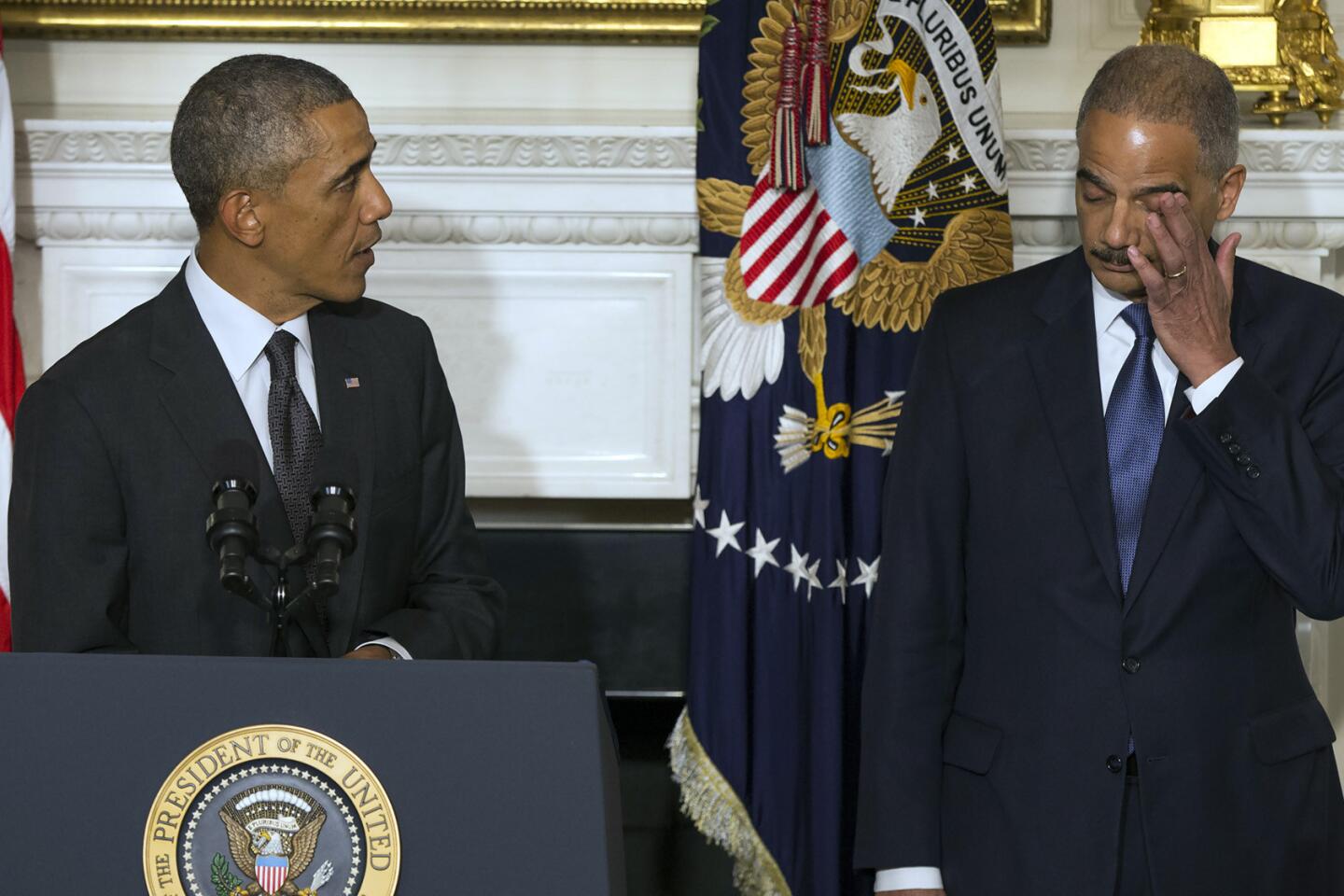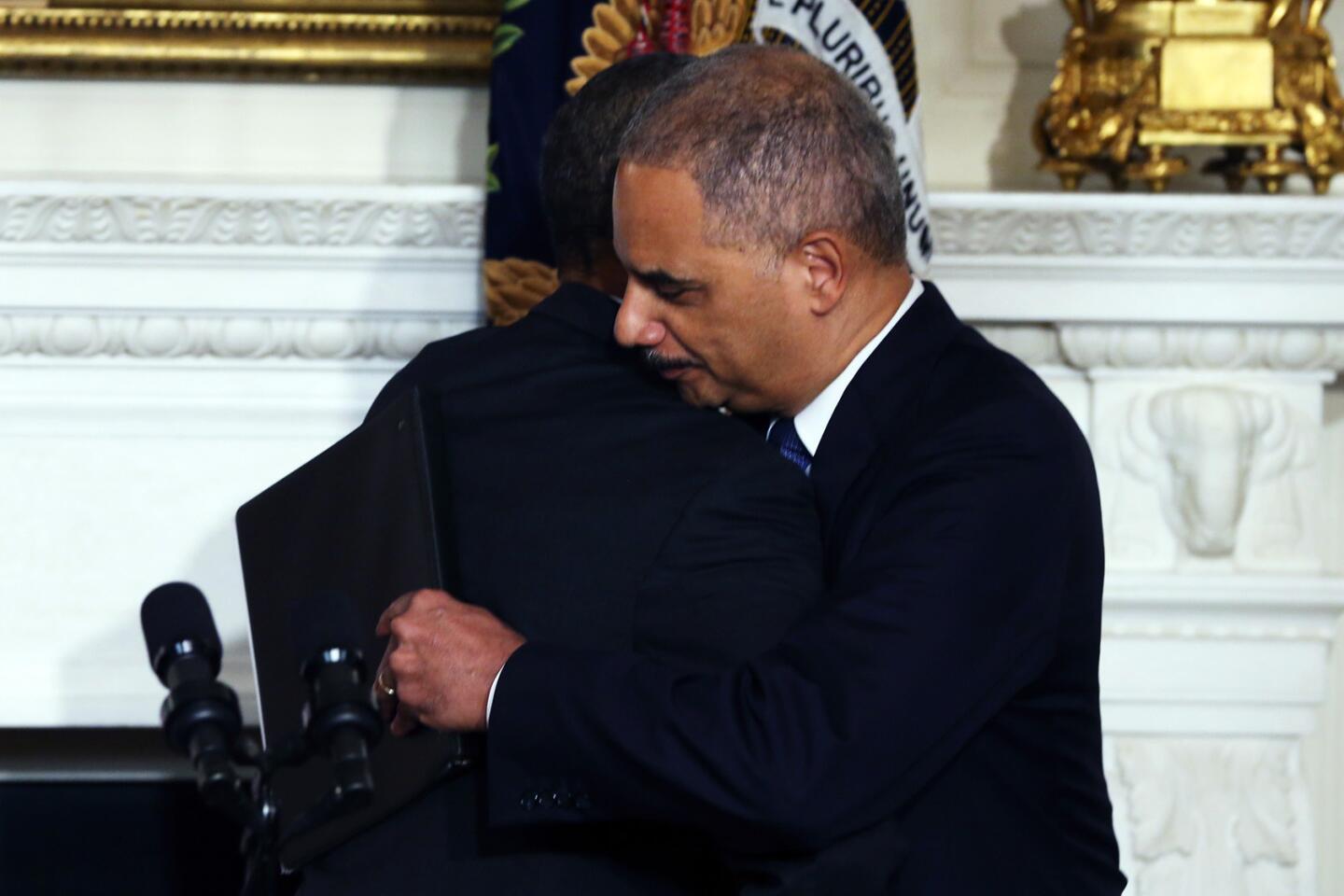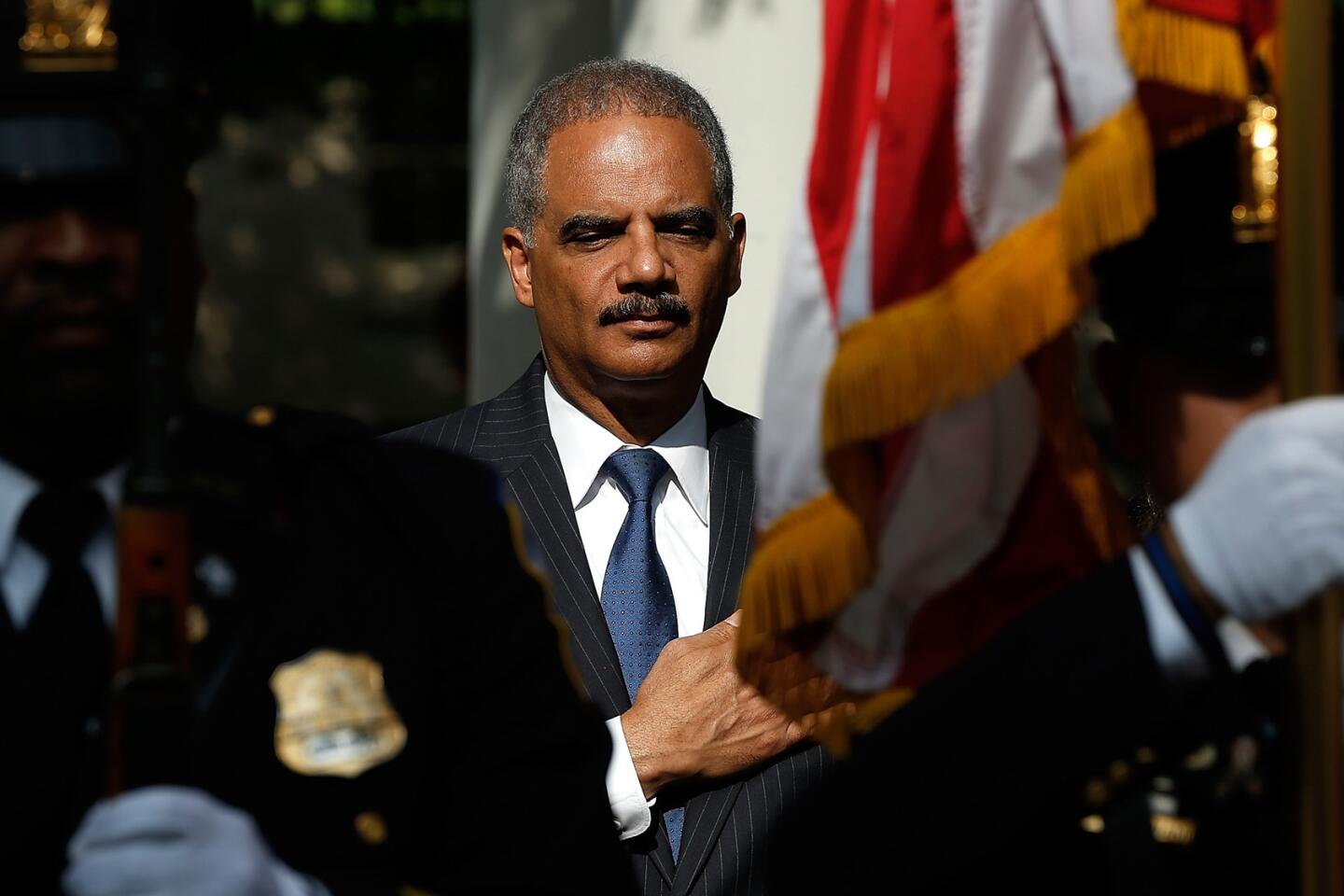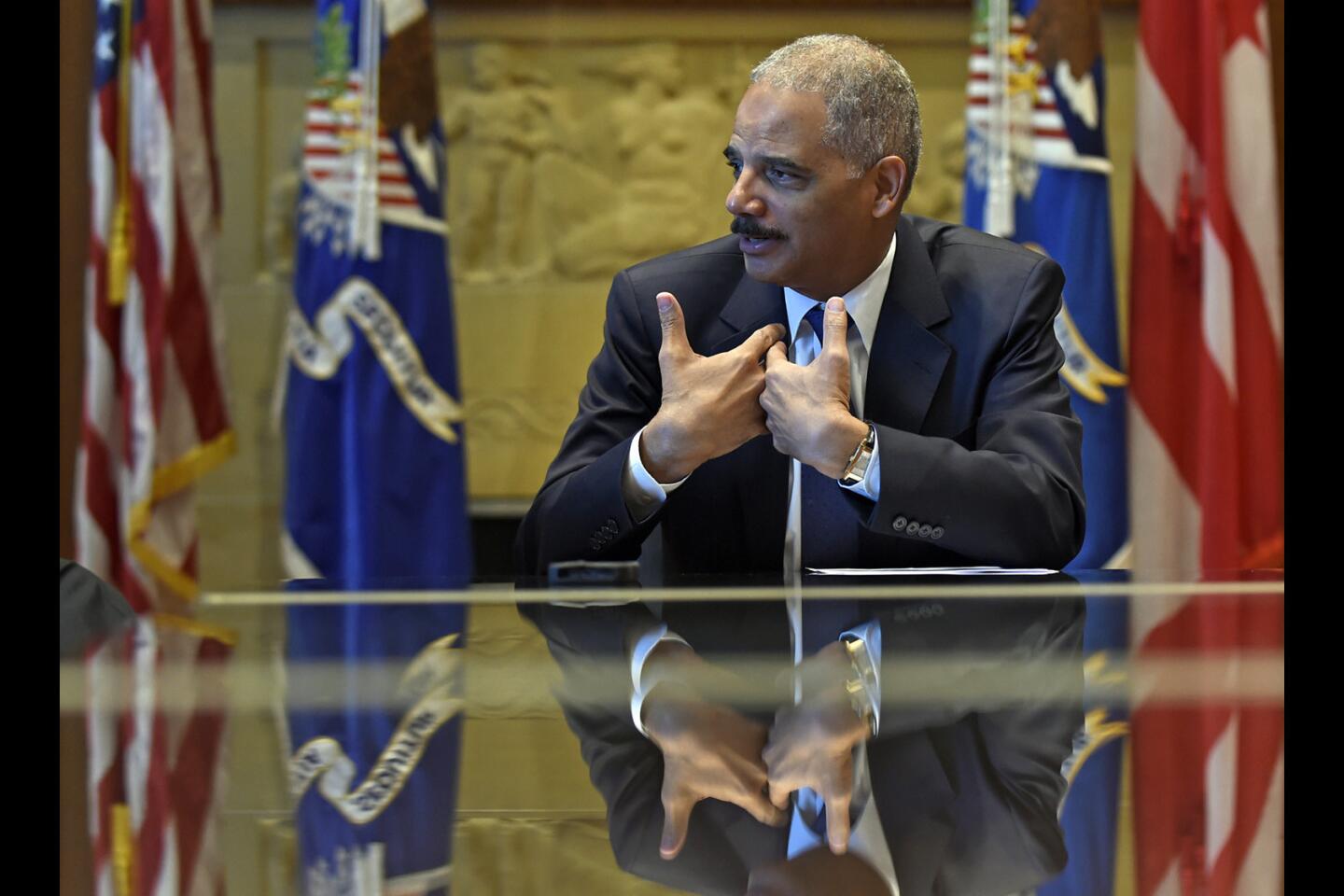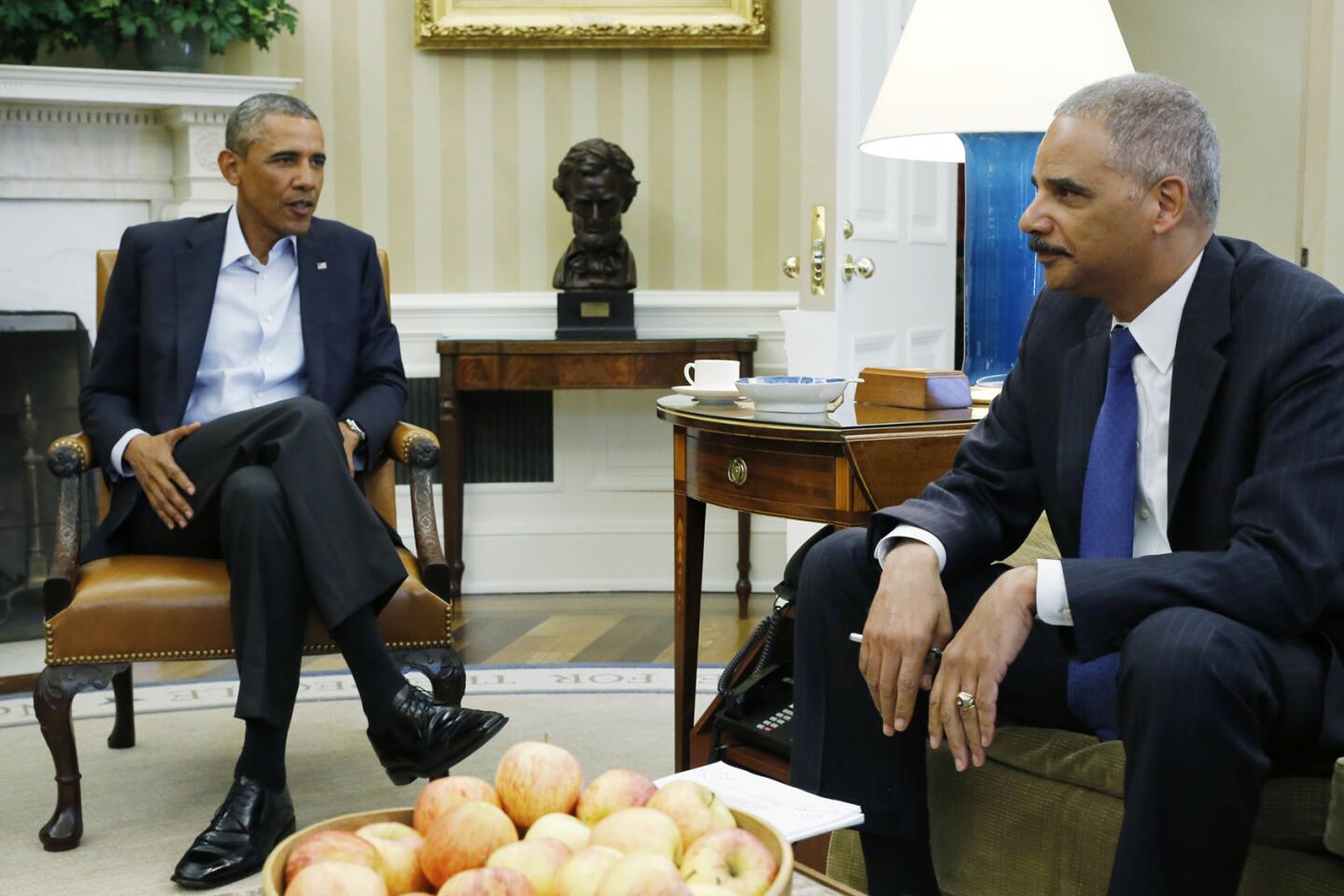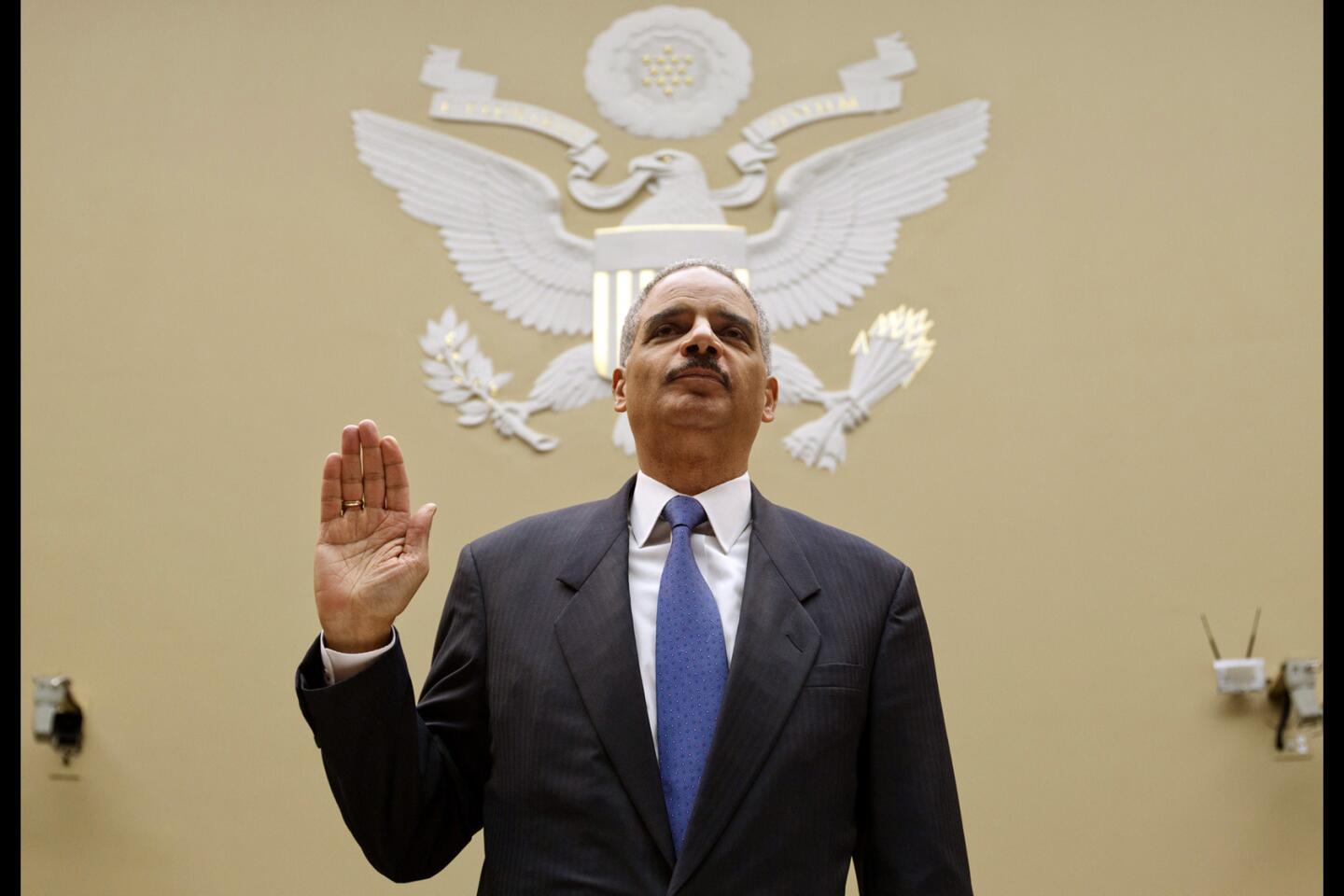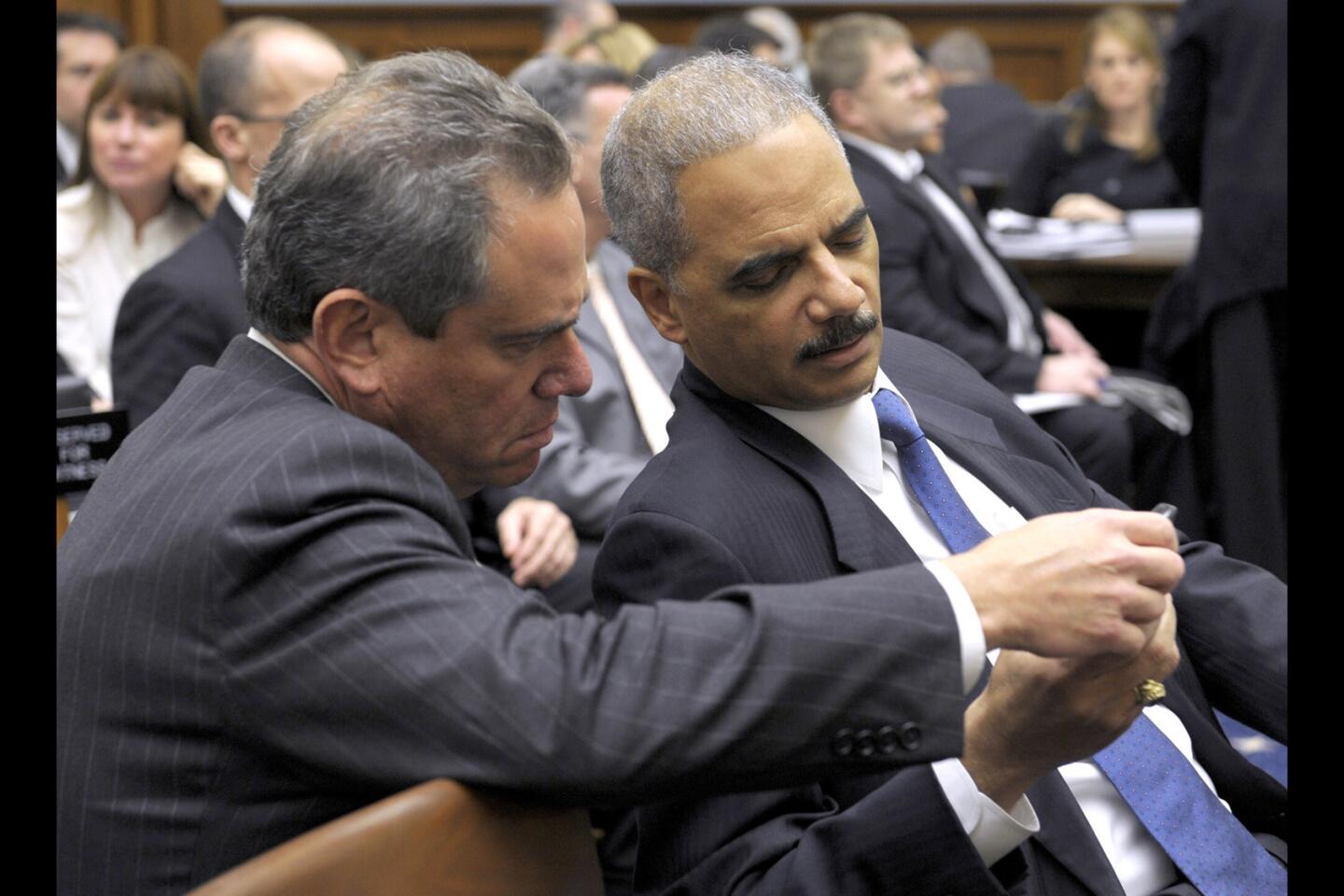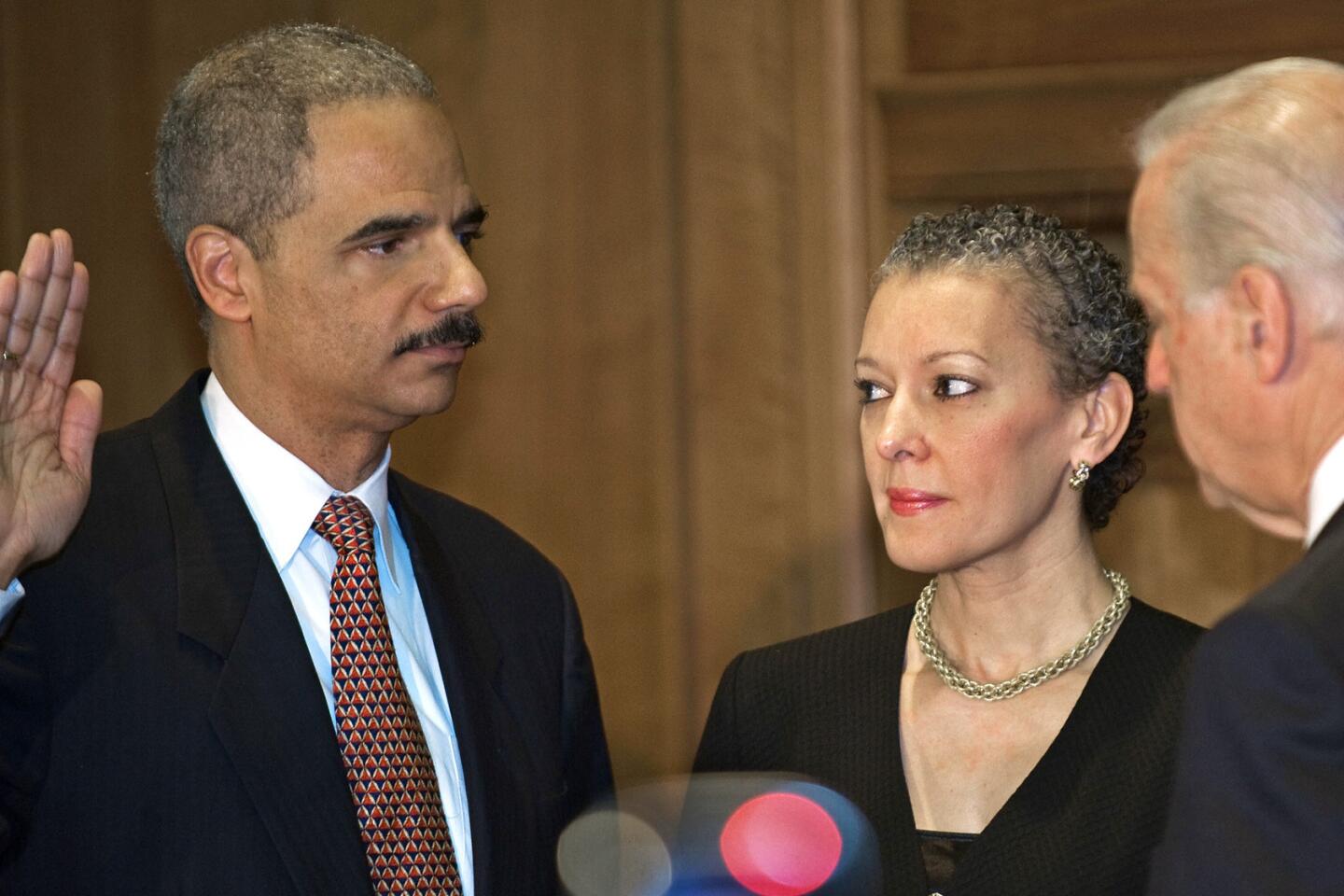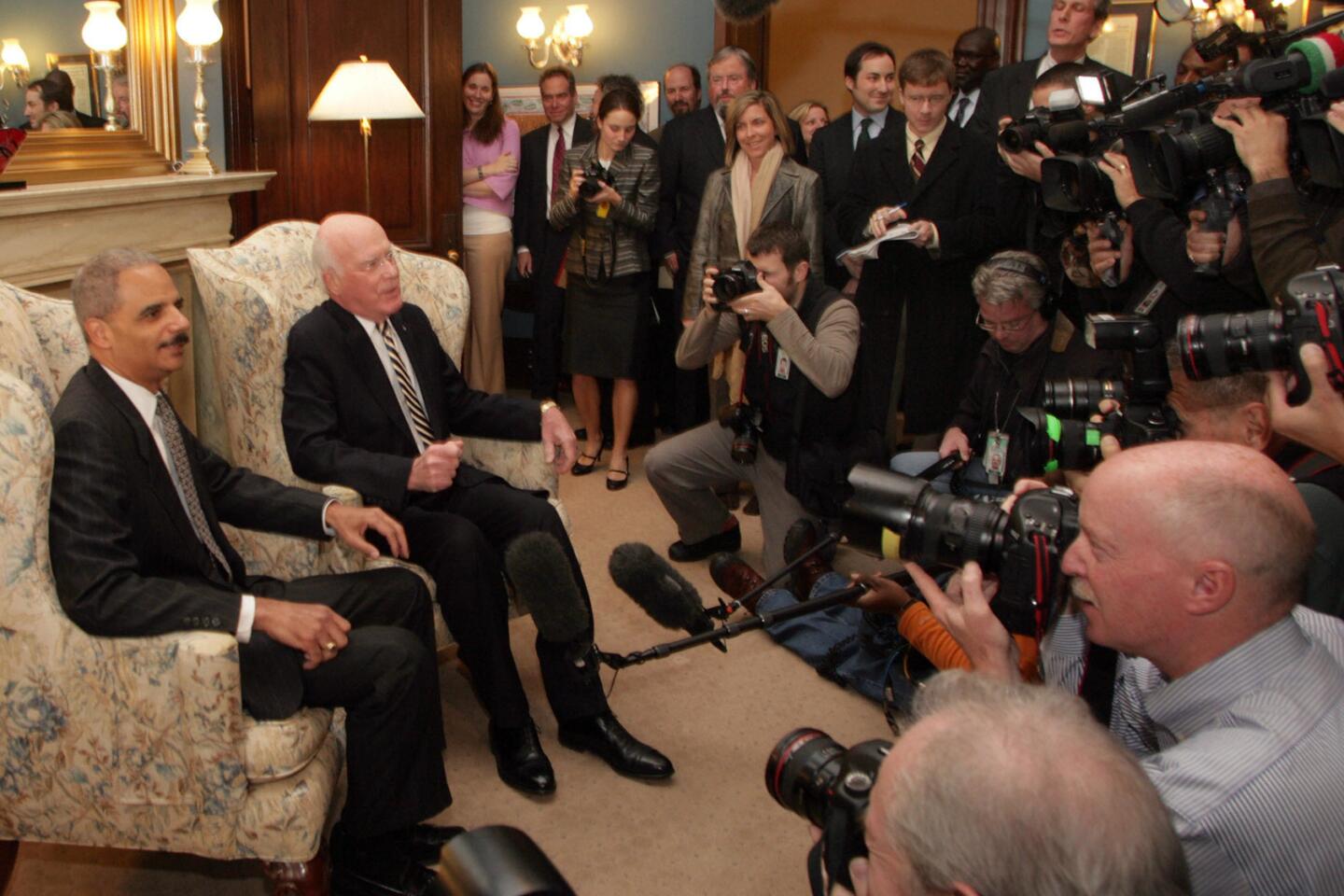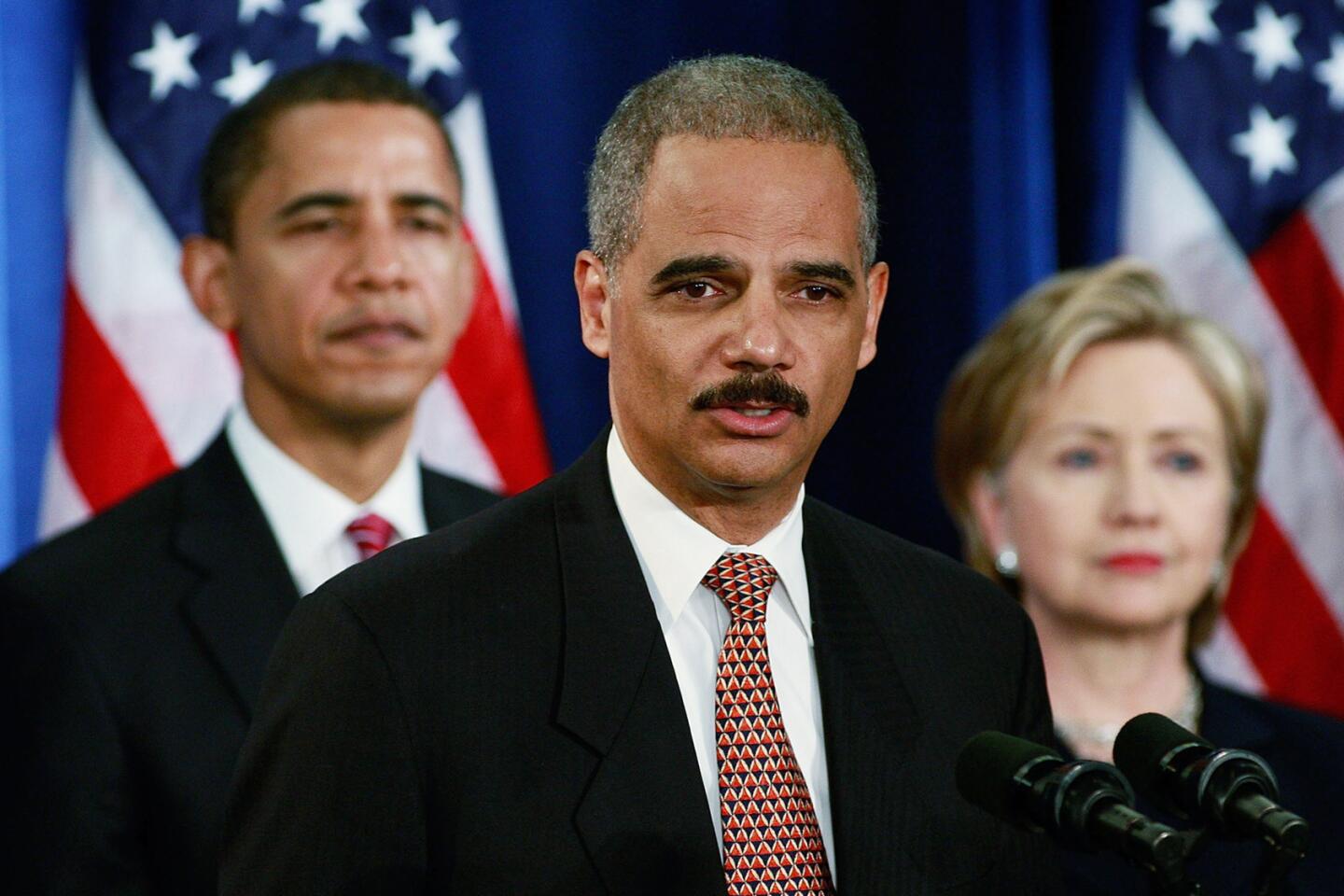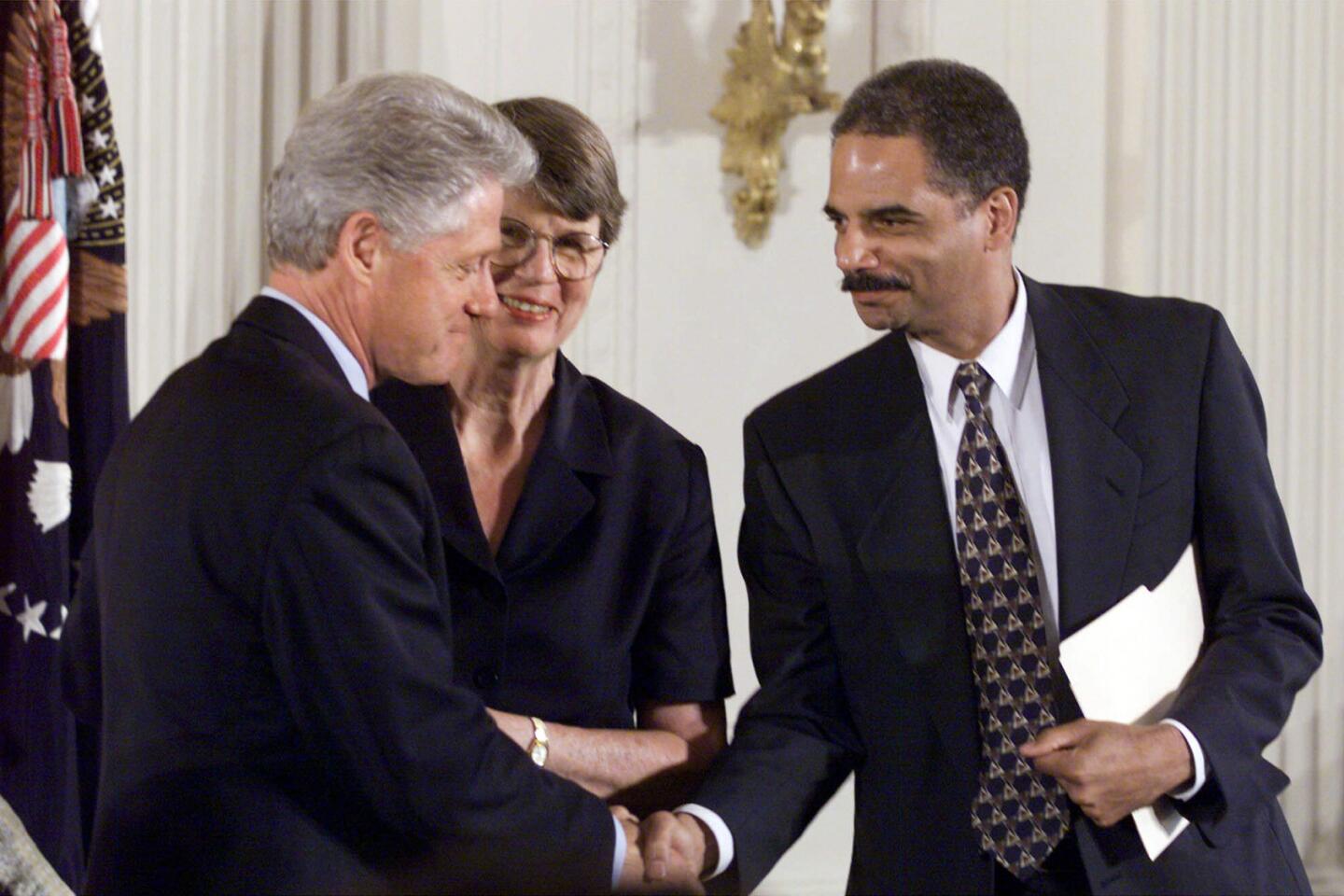Eric Holder: A legacy of highs and lows as attorney general
Eric H. Holder Jr. is stepping down as the nation’s 82nd attorney general after more than five tumultuous years. He leaves a legacy that will be praised by liberals and excoriated by conservatives. Here are some of the key points and issues of the tenure of Holder, one of the nation’s longest-serving attorneys general.
Holder was always a striver. He was born in the Bronx, raised in Queens and attended the prestigious Stuyvesant High School in Manhattan before going to college and law school at Columbia University. After graduating law school, he moved to the Justice Department’s Public Integrity Section, launching a distinguished career that included his appointment to the federal bench by President Reagan; working as a prosecutor and winning convictions against criminals including Rep. Dan Rostenkowski; and returning to the Justice Department, where he served as deputy to Atty. Gen. Janet Reno. When Barack Obama won the presidency, Holder returned to become attorney general in 2009. He is one of three original Cabinet selections to still be in office.
High points:
Race: Holder, the nation’s first African American attorney general, has never been shy about confronting racial inequities, even in his days in college. As attorney general he sounded the racial theme early and often. In a speech on race relations on Feb. 18, 2009, Holder reminded blacks and whites:
“Though this nation has proudly thought of itself as an ethnic melting pot in things racial, we have always been, and we, I believe, continue to be, in too many ways, essentially a nation of cowards.
“Though race-related issues continue to occupy a significant portion of our political discussion, and though there remain many unresolved racial issues in this nation, we, average Americans, simply do not talk enough with each other about things racial,” he said.
Holder has spoken out against “stand your ground” laws -- an issue that arose after the Florida shooting of an unarmed black teenager, Trayvon Martin, by George Zimmerman. He called for an in-depth federal investigation of the recent shooting of another unarmed black man, Michael Brown, by a white policeman, Darren Wilson, in Ferguson, Mo. Many of the other issues that Holder has championed also evolved out of race-related turmoil.
Cops and courts: Holder’s tenure will be remembered for his focus on investigating the police and civil rights. The actions of about 20 police departments around the U.S. have been examined by the Justice Department, with a focus on how to protect minority rights confronting police power, usually wielded by white cops against African Americans and Latinos.
Holder has pushed for a series of prison reforms, particularly among those convicted of certain drug crimes. At a meeting of the Western Hemisphere security ministers last year, Holder noted that “although the United States comprises just 5% of the world’s population, we incarcerate almost a quarter of the world’s prisoners.”
This has led to policies that have drained public treasuries of billions of dollars to build prisons and billions more to hire guards and provide services. As a result of Holder’s and the president’s efforts, the U.S. Sentencing Commission voted in July to slash the sentences of 46,000 inmates serving time for drug offenses. If not blocked by Congress, nearly half of federal prisoners incarcerated for drug crimes will be eligible for sentence reductions averaging more than two years.
Voting rights: Holder was a staunch defender of the Voting Rights Act of 1965, which was reauthorized in 2006 and is generally credited with breaking whites’ political control in the South. After the U.S. Supreme Court struck down a key part of the law, Holder pledged to continue to push for its underlying philosophy of opening up the polls to as many people as possible.
By May 2012, the Justice Department was fighting voter identification laws in more than a dozen states. Holder argued that the new requirements limited voting, particularly among the young, elderly and minorities. Among the states challenged was Florida, a battleground state in presidential elections.
Gay marriage: In February 2011, Holder announced that the Justice Department would no longer defend cases involving the federal Defense of Marriage Act, on the grounds that it was unconstitutional to discriminate against those seeking same-sex marriage. In 2013, the U.S. Supreme Court struck down DOMA, opening the door to a slew of lawsuits seeking to legalize gay marriage across the nation. The court is expected to deal with that issue in its current term.
Low points:
Contempt of Congress: On June 28, 2012, Holder became the first U.S. attorney general in history to be held in contempt by the House of Representatives. Republicans, the majority in the House, argued that Holder was stonewalling efforts to investigate the Fast and Furious operation, a botched federal “gun-walking” scheme. The idea was to follow illegal guns as they moved through the criminal underworld of the Mexican drug cartels to get to the top people. The plan failed, and the guns were implicated in a number of crimes, including the killing of a U.S. Border Patrol agent.
Holder dismissed the congressional action, which has had no practical impact, as “the regrettable culmination of what became a misguided and politically motivated investigation in an election year.”
In September 2012, after a 19-month review, the Justice Department Office of the Inspector General cleared Holder of any other wrongdoing with regard to Fast and Furious, saying there was no evidence that Holder knew about the operation before early 2011. The report cited 14 lower-ranking officials for possible disciplinary action.
Terrorism plotters: Holder in 2009 announced that he wanted to bring some of the suspected plotters of the Sept. 11, 2001, attacks on the United States to New York to be tried in civilian court. He argued that trying them in civilian court was more appropriate and would show the world the power of U.S. justice. However, after complaints from lawmakers, New York officials and some of the families of those who died in the attack, Holder backtracked, saying the group, including Khalid Shaikh Mohammed, would be tried by the military at a special prison in Guantanamo Bay in Cuba.
Other security issues: Holder has defended Obama’s actions in seeking out and killing those identified as terrorists even if they have not been tried in U.S. courts. In May 2011, Holder testified before Congress that the U.S. acted properly in tracking down and killing Al Qaeda leader Osama bin Laden, saying international law allows for targeting enemy commanders.
Holder has also defended the legality of drone strikes, including those against Anwar Awlaki, an American citizen who was a leader and recruiter for the Al Qaeda offshoot operating in Yemen. Despite complaints from some civil libertarians, Holder established a three-part test for such attacks: the target poses an imminent threat of violence to the United States, capture is not possible, and the operation is conducted in a manner consistent with the rules of war.
Media: The Obama administration has had a sometimes troubling relationship with the media. In May 2013 the Associated Press announced that telephone records for 20 of its reporters, covering a two-month period in 2012, had been seized by the Justice Department. Holder recused himself from investigations of the incident and defended the media.
But that commitment to the 1st Amendment was thrown into doubt when it was also reported that the department had monitored Fox News reporter James Rosen’s activities by tracking his visits to the State Department. NBC confirmed that Holder had personally signed off on Rosen subpoenas. Justice officials defended the action, saying it had met the test of national security needs.
Follow @latimesmuskal for national news
More to Read
Sign up for Essential California
The most important California stories and recommendations in your inbox every morning.
You may occasionally receive promotional content from the Los Angeles Times.
